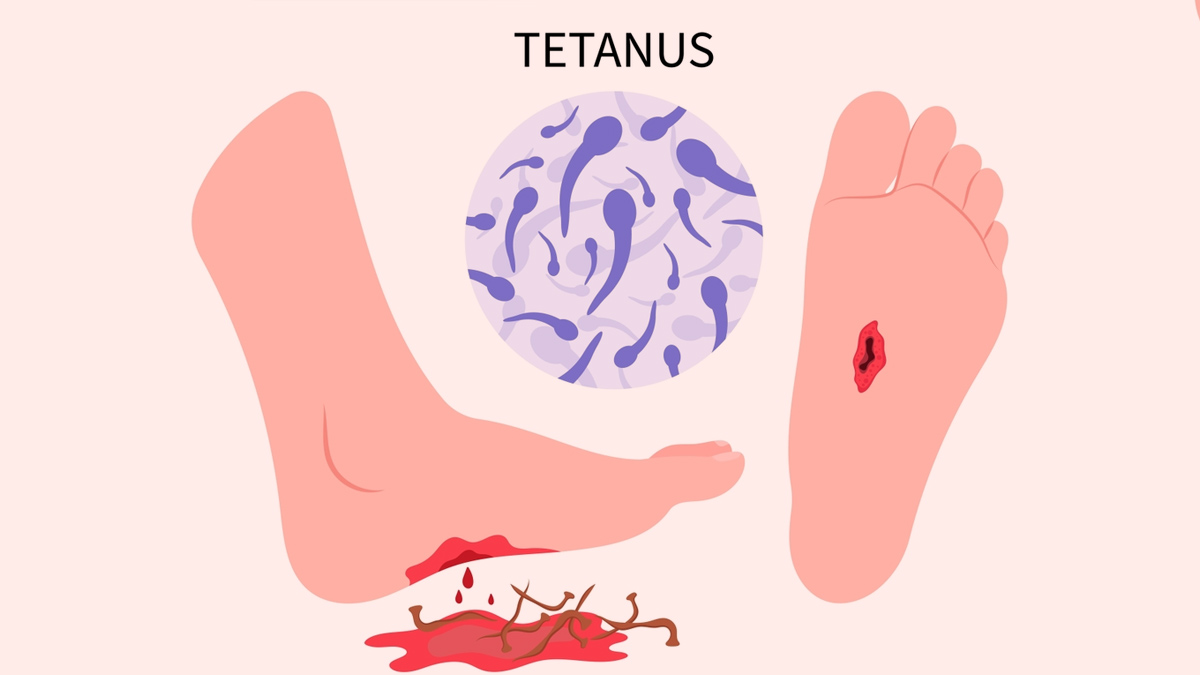
Tetanus isn’t something we hear about often, but it’s a serious infection that can cause painful muscle spasms and stiffness, starting in the jaw and moving to other body parts. Although it’s rare, tetanus can be very dangerous if not treated properly, especially if you’re not vaccinated or have a weak immune system. The good news is that you can easily protect yourself from tetanus with a few simple steps. Keeping your vaccinations current and taking care of wounds properly can make a big difference. Here’s how you can stay safe and avoid this serious infection.
Table of Content:-
What Is Tetanus?

According to StatPearls, tetanus is an infection marked by intense muscle stiffness and painful spasms, particularly in the jaw and neck. It typically affects individuals who are unvaccinated or older adults with diminishing immunity. The muscle spasms caused by tetanus can vary in duration, lasting from minutes to weeks, often beginning in the face and gradually spreading to other body parts.
Symptoms may also include difficulty swallowing, fever, and sweating. Without timely treatment, tetanus can cause severe complications and even be fatal.
Also Read: Tetanus Infection: Know Its Various Symptoms, Causes And Treatment
Tips To Prevent Tetanus Infection
1. Keep Up with Your Tetanus Vaccination

Vaccination is one of the most effective ways to prevent tetanus. The tetanus vaccine, often given in combination with vaccines for Diphtheria and Pertussis (DTP or Tdap), provides long-term immunity.
- Initial Vaccination: Children typically receive their first dose of the DTP vaccine around two months of age, followed by additional doses at 4, 6, and 15-18 months, and a booster at 4-6 years of age.
- Boosters for Adults: Adults should receive a tetanus booster shot every 10 years. If you sustain a significant wound and your last booster was more than five years ago, you may need an additional booster.
Consult with your healthcare provider to ensure you and your family are up-to-date with vaccinations. According to the Centers for Disease Control and Prevention (CDC), the United States reports about 30 tetanus cases annually. Most of these occur in people who are unvaccinated or haven't received the recommended tetanus booster every decade.
2. Clean Wounds Properly
Proper wound care is crucial in preventing tetanus infection. Here's how to manage cuts and injuries effectively:
- Immediate Cleaning: As soon as you get a cut or wound, clean it thoroughly with soap and water. Removing any dirt, debris, or foreign particles helps minimise the risk of infection.
- Disinfection: After washing, apply an antiseptic to reduce the risk of bacterial infection.
- Medical Attention: Seek medical attention for deep, large, or dirty wounds. A healthcare professional may recommend a tetanus booster or additional treatment.
3. Practise Good Hygiene

Maintaining overall good hygiene practices can help prevent infections, including tetanus:
- Personal Hygiene: Regularly wash your hands with soap and water, especially after handling soil, gardening, or dealing with animals.
- Clean Environment: Keep your living areas clean and free from contaminants. Ensure that any cuts or abrasions are treated promptly.
Also Read: Is Poor Oral Hygiene Linked To Pancreatic Cancer Risk?
4. Be Cautious with Puncture Wounds
Puncture wounds, such as those from nails or animal bites, are particularly susceptible to tetanus infections. If you receive a puncture wound:
- Immediate Action: Clean the wound thoroughly and apply an antiseptic.
- Seek Medical Help: Visit a healthcare provider to evaluate the need for a tetanus booster, especially if your vaccination status is not current.
5. Ensure Safe Practices in High-Risk Activities
Certain activities pose a higher risk for tetanus exposure, such as:
- Gardening: When working with soil or compost, wear gloves to protect your hands from cuts and abrasions.
- Handling Animals: If you're involved with animals, particularly those with unknown vaccination histories, be cautious of bites and scratches.
6. Understand Risk Factors and Conditions

Certain conditions can increase the risk of tetanus infection:
- Chronic Health Issues: Individuals with chronic health conditions or weakened immune systems may be more susceptible to infections.
- Pregnancy: Pregnant women should ensure their vaccinations are up-to-date to protect themselves and their newborns from tetanus.
7. Seek Prompt Medical Care for Symptoms
If you develop symptoms of tetanus, such as muscle stiffness, difficulty swallowing, or severe jaw clenching, seek medical attention immediately. Early treatment is crucial and may involve administering Tetanus Immune Globulin (TIG) and antibiotics to neutralise the toxin and prevent further progression.
[Disclaimer: This article contains information for informational purposes only, hence, we advise you to consult your own professional if you are dealing with any health issues to avoid complications.]
Also watch this video
How we keep this article up to date:
We work with experts and keep a close eye on the latest in health and wellness. Whenever there is a new research or helpful information, we update our articles with accurate and useful advice.
Current Version